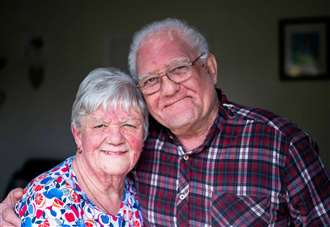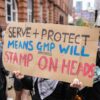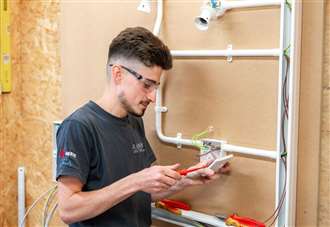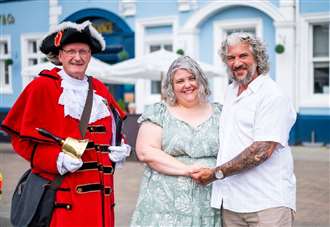-
 play_arrow
play_arrow
KL1 RADIO KL1 Radio Local Radio for West Norfolk
-
 play_arrow
play_arrow
KL DISCO KL Disco Playing Disco Music from the 70's onwards.24/7
-
 play_arrow
play_arrow
KL COUNTRY KL COUNTRY Playing New and Classic Country Music 24/7
-
 play_arrow
play_arrow
KL ROX KL ROX The best of New and Classic Rock.24/7
-
 play_arrow
play_arrow
KL SUMMER Summer Vibes 24/7 from KL1 Radio across West Norfolk
-
 play_arrow
play_arrow
KL CHILL Just Chill!
-
 play_arrow
play_arrow
KL POP The Best POP Hits all day Long!
-
 play_arrow
play_arrow
KL XTRA KL XTRA, The PopUp Station from KL1
music_note

Pioneering surgery has helped to restore the sight of a West Norfolk man who lost his vision a year ago.An overjoyed Paul Mainwaring, 65, of Dersingham, said how amazing it is to see his wife’s face after his vision loss drastically changed both their lives.The former history-making publican is the first patient at the Norfolk and Norwich University Hospital to undergo the new type of cornea transplant called a two-piece mushroom keratoplasty, which has a higher success rate.And he told Your Local Paper just what it means to him and wife Maggie.Speaking on a bright day, Paul said: “It’s a sunny day, the sky is blue, there’s no clouds, the grass is green – it’s absolutely fantastic.” Paul lost his sight due to scarring in both corneas (the clear window of the eye) and has not been able to walk and do other things without assistance since.He underwent the new type of two layered corneal transplant on April 3 with surgery performed by Chrishan Gunasekera, one of only a few surgeons in the UK to perform the specialist operation after learning the procedure from the pioneering surgeon Professor Massimo Busin in Italy.Paul said: “On April 2, I was blind, on April 4, I could pick out shapes and shades. My left eye is a bit smoky but that’s possibly because of a cataract and once everything has healed sufficiently Chrishan has said he will remove the cataract.”His eyes are now healing nicely and Paul said before the procedure Mr Gunasekera told him: “Paul, I’m telling you, you will see.” In paying tribute to both the skill of the surgeon and the help of his wife, Paul said: “She has been absolutely fantastic, It’s not just me who has suffered, she has had to be my taxi driver, having to do everything for me.”Paul, who retired 15 years ago due to ill health, told the surgeon he wanted to see in time for his 28th wedding anniversary on April 26. “I said I want to see by then and he (Mr Gunasekera) said you will be able to see your wife.” And when he did, Paul said it was like looking at a new woman because Maggie, who he has been with for 39 years, had lost six stone in weight during the year he was without sight.Mr Gunasekera said: “The operation, which typically takes a couple of hours, involves splitting the donor cornea into two layers, maximising the chances of good vision and transplant survival. “The mushroom configuration of the surgical wound results in faster healing and preserves the structural integrity of the eye. The technique is particularly beneficial for patients previously considered high risk of corneal transplant rejection and failure.“The results are fantastic and the improvement in the quality of life for patients is huge. Paul’s vision has been restored and he is no longer legally blind. It’s brilliant that we can now offer this type of surgery to people across Norfolk and Waveney.” Paul said: “I am in awe of Mr Gunasekera because last week I came to hospital and walked from the waiting area to the clinic room unaided, which I haven’t been able to do for 12 months. “He’s also instilled in me so much confidence. He told me I will see again, so I’ve set myself a target to get back driving.”He added: “When I lost my vision life changed so much. It’s been a considerable journey for us both, not just me. My wife has had to do everything for me. She became my carer.“I am so thankful to Mr Gunasekera and absolutely delighted with how things are going so far after my operation.”The dad and grandad was the youngest landlord in England when at 21 he took over The Flowerpot pub at Wisbech which he ran for nine years.The surgery has the benefits of improved vision and a reduced risk of transplant rejection. With this type of transplant, 75 per cent of the patient’s cells in their inner cornea are left, which reduces the risk of transplant rejection to around five per cent compared to 40 per cent in other procedures.
Similar posts
Upcoming shows

Weekend Back Trax
6:00 am - 8:00 am

Kelvin Scott – Weekend Breakfast
8:00 am - 11:00 am

Vicky Green – Classic Hit Lunchtime
11:00 am - 1:00 pm

Darren Furzey – Classic Hit Weekend
1:00 pm - 3:00 pm

Lee Vincent – Classic Hit Saturday
3:00 pm - 6:00 pm
-

Paris Olympics off to a sodden start with a rain-drenched opening ceremony

Three children who died in house fire are ‘missed beyond measure’, parents say

John Hunt says messages of support ‘like a hug’ following family crossbow deaths

Police officer under criminal investigation for assault after airport video

Hunstanton Fossil Hunting Trip – 18th August 2024
Message Us Now!
Copyright The Mediasite UK - 2023.



